Nationalism- A love for one’s country.
Imperialism- The act of one country taking control of the other.
Treaty of Versailles- Treaty that blamed and brutally punished Germany and its allies for the war.
Idealism vs. Realism- Realists punished harsh idealists punished lightly.
Fourteen Points- Presented to the U.S. people to give cause for the war.
Self-determination- People vote on who they want to govern them.
War Guilt Clause- Clause that crippled Germany to almost nothing.
W.C.T.U. - Group of woman that banned the sale of alcohol in the U.S.
League of Nations- Group created after World War I to prevent any future wars.
Collective Security- Idea that if someone in the group was attacked the other countries would help.
Woodrow Wilson- President of the U.S. and created the fourteen points.
Economic Sanctions- Sanctions that cripple economies.
Hoare-Laval Plan- Plan to give Italy Ethiopia if they were to start fighting.
The Locarno Pact- A series of treaties between France and Germany that settled disputes.
Kellogg-Briand Pact- A treaty that tried to outlaw war.
Washington Conference- The first meeting of military strategy between the U.S and Britain following the United States entry into World War 2.
Bourgeoisie- The middle class of a country.
Proletariat- Workers or working class people.
Exploitation - The act of making land or area more profitable.
Dictatorship Of The Proletariat- A socialist state in which the working class has political power.
Cadet- A young trainee in the armed services or police force.
Bolshevik- A member of the majority faction of the Russian Social Democratic Party.
Menshevik- A member of the non-Leninist wing of the Russian Social Democratic Workers party.
October Manifesto- A document that served as a precursor to the Russian Empire's first constitution.
Fundamental Laws- Law determining the fundamental political principles of a government.
Provisional Government- A temporary government put in place until a real one is elected.
V.I. Lenin- Was a Russian communist politician, political theorist.
Joseph Stalin- Russian leader who succeeded Lenin as head of the Communist Party.
Leon Trotsky- Founder and first leader of the red army
Peace, Land, Bread- Separate from world war 2, more property, better living conditions.
April Thesis- A series of directives issued by the Bolshevik leader on his return from exile.
Soviet- An elected local, district, or national council in the former USSR.
Alexander Kerensky- Served as the second Prime Minister of the Russian Provisional Government.
General Kornilov- A military intelligence officer, explorer, and general in the Imperial Russian Army.
Treaty Of Brest-Litovsk- It was a treaty that marked Russia’s exit from World War 1.
War Communism- A policy with the goal of keeping the Russian people stocked with food, weapons.
The Russian Civil War- A war in Russia between the Bolsheviks and the Whites.
Reds/Whites- The two main parties in Russia during World War 1.
Allied Intervention- A multi-national military expedition launched in 1918.
New Economic Policy- A policy used to boost the economy of Russia.
Comintern- An international Communist organization founded by Lenin in Moscow in 1919.
Treaty Of Rapallo- A treaty between Russia and Germany to give back all territorial claims.
Guns Or Butter- The "guns or butter" model is generally used as a simplification of national spending.
Command Economy- An economy where production, prices, incomes are determined by government.
Collectivization- The organization of a nation or economy on the basis of collectivism.
Kolkhoz- A collective farm in the former USSR.
Kulak- A peasant in Russia wealthy enough to own a farm and hire labor.
Five Year Plan- A plan for economic development on the basis of five years.
Gulags- A Russian prison camp for political prisoners.
The Purges- A series of measures to capture people thought as being spies (mostly Bolsheviks).
Gustav Stresemann- A German politician and statesman who served as Chancellor in 1923.
Duma- A legislative body in the ruling assembly of Russia
Imperialism- The act of one country taking control of the other.
Treaty of Versailles- Treaty that blamed and brutally punished Germany and its allies for the war.
Idealism vs. Realism- Realists punished harsh idealists punished lightly.
Fourteen Points- Presented to the U.S. people to give cause for the war.
Self-determination- People vote on who they want to govern them.
War Guilt Clause- Clause that crippled Germany to almost nothing.
W.C.T.U. - Group of woman that banned the sale of alcohol in the U.S.
League of Nations- Group created after World War I to prevent any future wars.
Collective Security- Idea that if someone in the group was attacked the other countries would help.
Woodrow Wilson- President of the U.S. and created the fourteen points.
Economic Sanctions- Sanctions that cripple economies.
Hoare-Laval Plan- Plan to give Italy Ethiopia if they were to start fighting.
The Locarno Pact- A series of treaties between France and Germany that settled disputes.
Kellogg-Briand Pact- A treaty that tried to outlaw war.
Washington Conference- The first meeting of military strategy between the U.S and Britain following the United States entry into World War 2.
Bourgeoisie- The middle class of a country.
Proletariat- Workers or working class people.
Exploitation - The act of making land or area more profitable.
Dictatorship Of The Proletariat- A socialist state in which the working class has political power.
Cadet- A young trainee in the armed services or police force.
Bolshevik- A member of the majority faction of the Russian Social Democratic Party.
Menshevik- A member of the non-Leninist wing of the Russian Social Democratic Workers party.
October Manifesto- A document that served as a precursor to the Russian Empire's first constitution.
Fundamental Laws- Law determining the fundamental political principles of a government.
Provisional Government- A temporary government put in place until a real one is elected.
V.I. Lenin- Was a Russian communist politician, political theorist.
Joseph Stalin- Russian leader who succeeded Lenin as head of the Communist Party.
Leon Trotsky- Founder and first leader of the red army
Peace, Land, Bread- Separate from world war 2, more property, better living conditions.
April Thesis- A series of directives issued by the Bolshevik leader on his return from exile.
Soviet- An elected local, district, or national council in the former USSR.
Alexander Kerensky- Served as the second Prime Minister of the Russian Provisional Government.
General Kornilov- A military intelligence officer, explorer, and general in the Imperial Russian Army.
Treaty Of Brest-Litovsk- It was a treaty that marked Russia’s exit from World War 1.
War Communism- A policy with the goal of keeping the Russian people stocked with food, weapons.
The Russian Civil War- A war in Russia between the Bolsheviks and the Whites.
Reds/Whites- The two main parties in Russia during World War 1.
Allied Intervention- A multi-national military expedition launched in 1918.
New Economic Policy- A policy used to boost the economy of Russia.
Comintern- An international Communist organization founded by Lenin in Moscow in 1919.
Treaty Of Rapallo- A treaty between Russia and Germany to give back all territorial claims.
Guns Or Butter- The "guns or butter" model is generally used as a simplification of national spending.
Command Economy- An economy where production, prices, incomes are determined by government.
Collectivization- The organization of a nation or economy on the basis of collectivism.
Kolkhoz- A collective farm in the former USSR.
Kulak- A peasant in Russia wealthy enough to own a farm and hire labor.
Five Year Plan- A plan for economic development on the basis of five years.
Gulags- A Russian prison camp for political prisoners.
The Purges- A series of measures to capture people thought as being spies (mostly Bolsheviks).
Gustav Stresemann- A German politician and statesman who served as Chancellor in 1923.
Duma- A legislative body in the ruling assembly of Russia
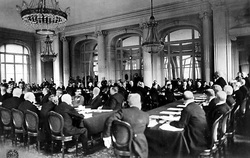
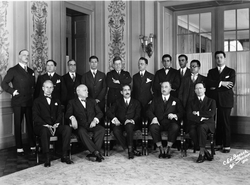
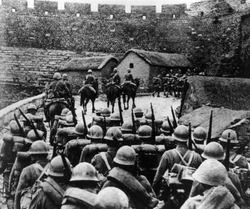
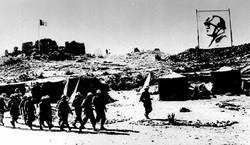
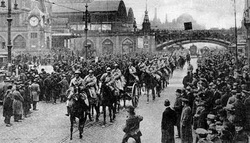
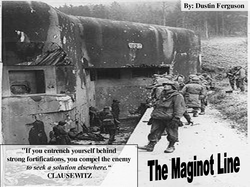
 RSS Feed
RSS Feed